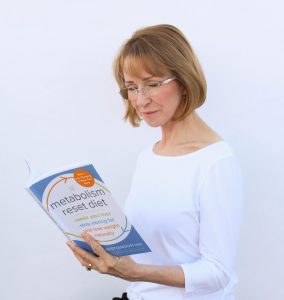It is a question I hear a lot: am I on the right amount of thyroid medication? I have seen people who have been on far too much, too little, and on the wrong type. Let me give you a better sense of what I mean, and what you can do if you are in this same situation.
Truly, it is a real paradox, where too much thyroid medication can feel almost exactly the same as too little. So, how would you know you are taking too much? It is really tough to tell if you are taking a higher dose than your body needs.
Because of that, you could have symptoms like:
- Hair loss
- Weight gain
- Fatigue
I really wanted to help you figure out more of what is going on with your thyroid medication dose. So, I made a calculator! This handy calculator will show you, in terms of percentage, how much your dose is (compared to your body’s actual needs).
The Concept of A Physiologic Dose

A physiologic dose is how much thyroid hormone your body would make, all on its own if it were working perfectly (Read: How to test your thyroid, the definitive guide). Ultimately, the goal here is to have you feeling your best while having your thyroid be as involved as possible.
Using The Thyroid Calculator
There are a few things that I like to explain with the calculator. This is to bring optimal clarity to your situation and your results.
Here is what you need to know…
Weight
Someone who is larger is going to need more thyroid medication than someone who is smaller. It is a pretty simple distinction, but one that we definitely want to make note of when we move forward.
Current Medications
In order for the thyroid calculator to work to its full potential, I am going to ask you for all the thyroid medications that you are currently taking.
If you are on more than one, do make sure to list them all out. If you are just on one, feel free to leave the other fields blank.
Gender
The reason for needing to know your gender is that women often have a lot of hormonal factors which can cause their bodies to require different amounts of thyroid than a man’s body would require.
If you are a woman, I am also going to be curious as to whether or not you are pregnant, on an oral contraceptive or a natural hormone replacement, as well as if you are menopausal and not on hormone replacement.
Bottom Line: These are all things that change your body’s typical thyroid output. It helps to know more about them to paint a really clear picture of whether you are on the right amount of medication for you and your needs.
How Will Your Thyroid Medication Results Look?

Here is what will happen: Once we have all of the numbers crunched, you will receive a number. This is a percentage of how much your thyroid medication satisfies your body’s physiologic dose (the amount your body would truly make in its best-performing form).
Let’s say that someone’s thyroid gland was removed and they were on the perfect medication for their needs. In this case, their percentage would be close to 100%. This would mean that close to 100% of their thyroid needs were being met by their thyroid medication.
On the other hand, if someone was on a small dose of thyroid and their gland was halfway underactive and halfway active. The percentage result for this scenario would be around 50% because their medicine is fulfilling half of their body’s needs in this situation.
Key Insight: When this number is over 100%, it means that you are taking more than your body needs. I have seen some people with results over 200, 300, even 400% – scary stuff! This is just far more than your thyroid would ever make if it was working perfectly on its own.
Understanding Your Thyroid Medication Results
There are two distinct scenarios in which this occurs:
- Your score is over 100% and your TSH is below 0.4. The paradox here is that when there is too much thyroid hormone, your body makes itself thyroid resistant (causing your TSH to go down). In cases like these, you can feel the same as if you were getting too little thyroid medication – the feeling is the exact same.
- Maybe your score is over 100%, but your TSH is not below 0.4. This is a case where your body is off when it comes to using these hormones.
- The first thing is whether you are taking your thyroid medication all by itself, with only water. Whether you know it or not, pairing your thyroid medication with anything but water can lead to malabsorption.
There are also some rare cases where digestive problems can also lead to the malabsorption of thyroid medication in the body. The truth is, though, that this is being made out to be more common than it truly is in most folks (Hypothyroid medication, factors that influence
Studies have shown, especially in patients with celiac, that thyroid malabsorption is present in particularly devastated intestinal tracts.
The last thing to think about is production quality. This especially true for compounded thyroid or an over-the-counter thyroid glandular. In general, these are not standardized products – so no one is truly confirming just how much thyroid hormone you are receiving.

Thyroid Medication and the Thyroid Calculator
Here is the comprehensive breakdown of the steps and how this helpful thyroid calculator can help you learn more about your health:
Step 1: The Dose
Please enter the dose of your thyroid medication or medications. As I mentioned before, if you are on one thyroid prescription, simply enter it on its own. If you are on multiple thyroid prescriptions, please do your best to enter them all.
If you are not on NDT, please enter your dosage in milligrams. Some of the most common products include:
- Naturethyroid
- WP Thyroid
- Armour Thyroid
- NP Thyroid
- Erfa
- Compounded desiccated thyroid.
Please enter your dose of T4 in mcg. Products here include:
- Tirosint
- Levothyroxine
- Synthroid
- Levoxyl
- Compounded T4
Finally, enter your dose of T3 in mcg. These products may include:
- Cytomel
- Liothyronine
- Compounded T3
Step 2: Weight
Enter your body weight in pounds to help the calculator gain a better sense of how much thyroid medication your body truly needs.
Step 3: Gender
After entering your gender, if you are a woman, please indicate whether you are premenopausal or menopausal.
Please include perimenopause in premenopause and postmenopause in menopausal (How to lose weight if you are in menopause).
Key Insight: You are defined as menopausal once you have not had a menstrual cycle for over one year (or have had your uterus removed).
Interpreting Your Thyroid Medication Results
Your full dose, that 100% number, represents approximately how much hormone your gland would make if it were working perfectly.
This is also the same as your approximate dose requirement. This would be if your thyroid gland were completely removed and you had perfect absorption of thyroid hormone pills.
Key Insight: Men and menopausal women generally need lower doses per body size than premenopausal women, due to the blocking effects that estrogen has on thyroid hormones.
Your percentage dose represents how much you are taking relative to your body’s full needs.
Doses which are well above 100% are either too high or suggest that your body has poor thyroid absorption or thyroid resistance (as I touched on before).
If your dose is under 100% and you still have hypothyroid symptoms, you may need a higher dose of thyroid medication (assuming your blood levels show you are not taking too much).
How much you are making assumes that your TSH is between 0.5 and 1.5 and your T3 and T4 or in the normal range. If they are, this number is the approximate percentage of the hormone your thyroid is producing.
Bottom Line: The higher this percentage is above 50%, the more likely your thyroid would be to increase its own production. The lower this number is below 50%, the less likely your thyroid would be to take over.

Your Thyroid Medication & You
Building the knowledge you have of your thyroid is so important.
It helps to get to the root cause of some of the symptoms that might be plaguing you every single day. That is the reason why we built this Thyroid Calculator in the first place: to help.
Use the calculator today to learn more about your thyroid (and your physiological dose) click here, the medications you are on, and if the two are lining up.
Once you have learned more, I would definitely recommend reaching out to one of the professionals at Integrative Health to initiate the next steps (Click Here to connect).

1. Schedule a Thyroid Second Opinion with me, Dr. C, Click Here for Details
2. Download and use my Favorite Recipes Cookbook Here
3. Check out my podcast Medical Myths, Legends, and Fairytales Here
Dr. Alan Glen Christianson (Dr. C) is a Naturopathic Endocrinologist and the author of The NY Times bestselling Adrenal Reset Diet, The Metabolism Reset Diet and The Thyroid Reset Diet.
Dr. C’s gift for figuring out what really works has helped hundreds of thousands of people reverse thyroid disease, lose weight, diabetes, and regain energy. Learn more about the surprising story that started his quest.


